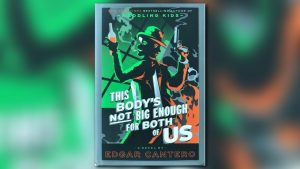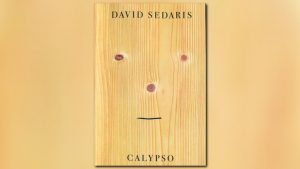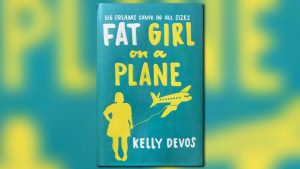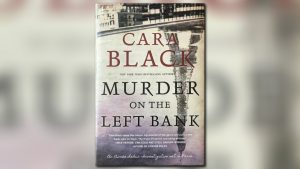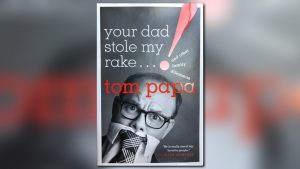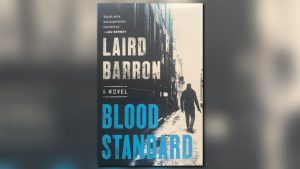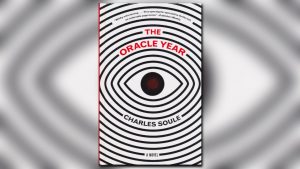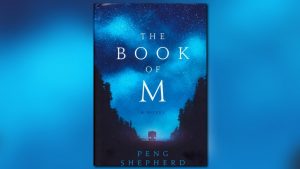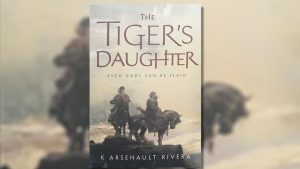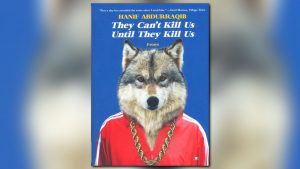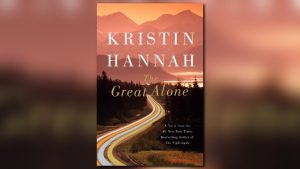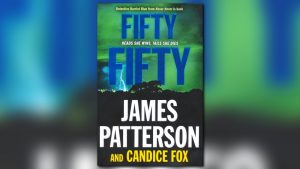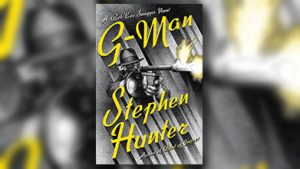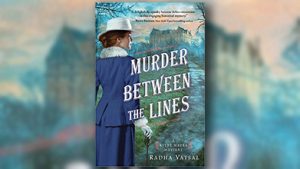Natalie Diaz’s When My Brother Was an Aztec examines memory’s role in human identity.
Each section filters memory through specific individuals and settings.
Racism against Native Americans is confronted throughout the collection, and the speaker’s wrestling with identity is carefully woven into each poem.
Each poem is stitched into the reservation’s landscape, while many consider Christian identity.
Natalie Diaz experiments with form, from couplets to parts, lists to prose poems, and explores the terrain of poetic predecessors.
VOICE OVER: And now, an Eight original production.
VOICE OVER: Books & Co. is made possible by the Virginia G. Piper Center for Creative Writing, serving writers and readers in the Phoenix metropolitan area, the state of Arizona and the world.
ALBERTO RIOS: Welcome to "Books & Co. ." Bienvenidos, todos. I'm your host, Alberto Rios. We're joined today by Natalie Diaz who's talking about her book of poems, "When My Brother Was an Aztec" published by Copper Canyon Books. Welcome, Natalie.
NATALIE DIAZ: Thank you for having me.
ALBERTO RIOS: I am thrilled to be able to talk about this book. It is a powerful compendium of personal life lived. And I don't know how you want to begin to talk about it but perhaps you can tell us a little bit in general about the book. "When My Brother Was an Aztec." That was the title.
NATALIE DIAZ: Yeah, I think that is a good place to start. For me, the Aztec imagery is really important. I'm Native and Spanish. My father jokes and says all his children are Mexicans because of that. Because his parents are from Spain and my mother is Native.
ALBERTO RIOS: Perfect definition.
NATALIE DIAZ: And the imagery of the Aztecs was really compelling for me. "When My Brother Was an Aztec" was probably the first real poem I felt kind of cracked me open. And I thought this is what poetry can do to me and for me. And so with the Aztec imagery, I felt like it paralleled a lot of the poems in the books, the things I was writing about, you know, because when we think about Aztecs, it's so easy to think violence, savagery, they'll rip your heart out and throw it down the temple steps. And I feel like our native community gets that same treatment a lot of times. And even possibly looking into a family, a large family like mine who suffer from having an addict in the family, it's very easy to look in and say savage, violent, dysfunctional, but there's also a lot of tenderness that happens and a lot of love and passion that we have for one another. And so the Aztec for me, that's what that meant. Yes, there were things that they did that we could look in on and say that was violent, that was savage but everything they did served a purpose, served a faith. And it was a responsibility. They took care of one another. And so for me, that title I think when I wrote that poem, it's when I kind of opened up that vein of writing about some of those really personal things that have a light and a dark side to them.
ALBERTO RIOS: And that's it. The word Aztec brings a stereotypical kind of baggage with it. You certainly move in an opposite direction. You write about family, no holds barred. Or we perceive that you do, whether you do or you don't, we'll talk about that but it feels like it's a no-holds-barred approach to things that happen. Everybody's family is different, obviously. But this is a book of stories about a family, about a speaker, and this speaker presumably because we know it's Natalie that's writing those is a female speaker and the trials and tribulations that come from that which are extraordinary. Where do you begin to talk about that and how do you explain this to the family you're writing about?
NATALIE DIAZ: This is the first question I usually get, you know, from other writers. Because we all have a family and we all have pains and sorrows, you know, right alongside the joys that we experience with our families. But I didn't set out to write about my family. For me, at least at this point in my career I'm still writing about the things that just worry me or bother me or that I wonder about. And I think maybe because I am so new to poetry and the ways of poetry, that I'm constantly surprised by things. And with, you know, the brother, you know, the speaker and the poem is very close to the I, I'm very close to the I, the speaker. And I think sitting down to write, see what's in me to write and I just kept returning to the family, these stories and I was away from home and you're hearing the stories and they're kind of screwing into you into the night and that's what I am pouring out onto the page, usually. I had the security of a little bit of distance when I was writing these and it wasn't until the book came out and I moved back home that I got to see some of that work and it was, you know, there's a lot of guilt that I felt in certain corners. But I think for me the most telling part of why I had to write the book was when I received my first few copies, the press sent you the first two copies and said you have a real book, this is real. And I gave one copy to my brother, the young man who's on the cover, and then I had a copy at home and the next morning my mother and my sister came over and I could tell my mother was very bothered by something and when I finally sat my mother down and got her to tell me what it is, she said well it's just that it didn't happen that way. And immediately my sister said what do you mean mom? That's exactly how it happened. And they were both completely right and both completely wrong. And I still don't know which it they were talking about. I don't know which it my mother meant when she said it didn't happen that way.
ALBERTO RIOS: That's the essence of family, family truth. Everybody's right, everybody's wrong. And it never ends. Which is probably a good thing. You have that heart-breaking opening because we have this character, the brother, who is a wild presence, so difficult to understand and you have that opening, he lived in our basement and sacrificed my parents. You have that relationship to the Aztec idea, that faraway notion but in my living room, whoever I am, in my living room, this happened. And so begins this story, many stories. When you wrote that line, it feels to me like that's an opening that just you can't come back from.
NATALIE DIAZ: And I think that was the breaking of my. I kind of broke into myself I think and, you know, it's kind of like, you know, one of the things I wanted the book to do is to invite readers one to the stories of this place, the desert, the community I've grown up in. But I wanted to pull them in a little bit of closer. There's a lot of dinner table imagery in the book but I also wanted to invite them to the table and that's what I kept envisioning as I was putting the book together and thinking like I want you to sit down and eat what we're eating and swallow the things we've had to swallow but at the same time, as with any dinner table, someone's going to laugh, someone's going to tell a joke. And so, you know, even though I think the book opens, you know, purposely with that poem, I wanted to start my readers off with a crack that I felt I was writing from. But, you know, I think that it also -- because it is in the home, it does open up there and in the living room, in the basement, it also gives us a lot of space to let some of the other things like compassion and tenderness slip in, and I think that's one of the reasons I think why I've been able to write about some of these subjects because they're not all just shadow for me. There's definitely a bright side.
ALBERTO RIOS: In writing these, you fill out the feeling, it doesn't get to be a shallow or a small feeling. Everything gets bigger. You have this -- you're talking about the kitchen table and all of the things that we eat and all the different people that we are. One of my favorite ways that you do that is with different languages. You bring in a mixture of English certainly; Spanish that comes in, surprising ways, native languages which sometimes switches, sometimes, native English, and you have some very specific things. “Now, go get that white boy's candy, it's in the road.” You have a very specific way of making us hear that and putting it into our own mouths and I think it's pretty intriguing. And then the Spanish that keeps coming in, tell me about how that all works for you.
NATALIE DIAZ: I think -- I love languages. You know, I grew up in a family that was surrounded by languages. It was Mohave or Spanish or English or the things that fall in the cracks when people are trying to understand one another. So for me, you know, one of the things that language -- I want the words I use to mean something to me. And so each word is really important. Down to like whether it's English and going back to etymologies or, you know, if I think or feel it in Spanish, I want to say it in Spanish, you know. Because for me, that's where the vibration of the language is, is in the first way it came to you. And I think that's tough sometimes with English. English is such a beautiful language but we are allowed to skirt so many corners sometimes. And so, you know, it's the same thing with Mohave. If I mean it in Mohave, that's the way I want to say it first, knowing my reader probably isn't going to be able to understand that. And even making the choice not to translate some of those phrases or lines.
ALBERTO RIOS: It makes sense in that it's giving us a bigger truth. I love finding some things that were very familiar to me, culturally, as well. [ Speaking Spanish ] The different sayings that you hear growing up. And to think that they are transcultural. They're everywhere.
NATALIE DIAZ: My father would say -- it's like he would rub his hands together, and then he would touch whoever we were and we would think we were cured. All of a sudden, we would get up and run off.
ALBERTO RIOS: The great magic. It's worked for centuries.
NATALIE DIAZ: It's always great when I hear someone say oh, my grandma said that.
ALBERTO RIOS: I heard the same thing. My son heard it. I think it's really quite wonderful. One of the things that you do as I'm reading through the poems is you invoke the names of other writers and you do that quite a bit. Norca, rembo. I'm just curious about that attention to other writers. When I get to them, I'm thinking oh, Natalie! You are that writer right now! But you're still nodding to those other writer, which is fine. It's not a criticism in any way. I'm just curious how you feel about letting them into your poems.
NATALIE DIAZ: Well, I mean, it's something we've learned very early on growing up where I've grown up. You always say I wasn't there but I heard this. I didn't see it but I was told... And I think that's how it feels for me. You know, I'm very affected by the imagery of Norca and the ways they've managed to cram emotion into image. And for me, I almost feel like I'm having a conversation with them when I'm doing this. So I can read -- I often start writing from reading so I'll usually read first but it might be a poem that I'm spinning around in my head of theirs or that I've just been sitting reading through some of their work that just sends me flying to the page. And that's I think for me, I feel like I'm talking to them, you know, like I'm, you know, it's kind of like, you know, hey, I can equate it to basketball. You're playing a game and you know you hit a nice shot but there's somebody in the stands who's really legit and if you ever had the opportunity you could be like that one was for you. I think it's a little bit of that. And I think they're my literary family I feel like. And, you know, even though they've never literally talked with me, they've been a very important part of the conversations I've had. It feels very natural to bring them to the page and it's something I don't usually miss. I didn't notice a lot of it until somebody pointed out oh, yeah oh, yeah, you know.
ALBERTO RIOS: It's a great way to conceptualize it. I would like to take a moment to remind our viewers, you're watching "Books & Co." I'm the host Alberto Rios. We're joined today by Natalie Diaz talking about her book of poems "When My Brother Was an Aztec." Well, so many things happen here. I want to talk about poetry itself for just a moment. And you have some wonderfully meditative anti-narrative events in here. You have the wonderful narration, for example, on I guess it was on red, on menstruation, a whole poem that doesn't talk about it, except in imagery and in color and in moments. And it doesn't stop and it just gets better and better. But you're not telling a story. And yet, of course, we're transfixed by it.
NATALIE DIAZ: I mean, I think it's a different type of narrative. And for me, it was kind of an intense studies of a single word or image or object. In that case it was red. But for me just to kind of break those words apart and let them tell their own stories and so just that piling on of image and phrase and language and, you know, I found as many words as I could find for red, and then I found which words mean something to me. And so I just kept piling them on and I wanted it to feel overwhelming. I wanted my reader to want it to stop or maybe to trip over a line or wonder when it was going to stop. And I think that is also a type of story. And, you know, the focus originally was cramps. And so I always tell that before I do the reading. And so it makes -- you can see when people get extremely uncomfortable. I think by the time I say corned beef hash, you can see it in everybody's faces. I think that's another type of narrative, just to let language in kind of a fragmented way tell you what it wants to tell you and it ends up being more political than I expected.
ALBERTO RIOS: You had to be there, makes sense in the poem.
NATALIE DIAZ: For sure. But, yeah, it's something -- I enjoy doing it. It's a very specific process I do for those poems.
ALBERTO RIOS: I was reminded of Pablo Neruda's association with the color green that he does throughout his work. It comes through in other ways in your work. A lot of leitmotifs that are active and they're good agents of surprise. We keep coming to them. Sometimes, they're narrative like eating horses. That one made me laugh. That shows up several times and maybe you can talk about eating horses, and then I want to talk about tarantula migrations.
NATALIE DIAZ: A joke my elder always tells and you have to be taught to learn how to react to the joke. He always starts and he says yeah because the cavalry came and they hit us pretty hard at fort Mohave and he says they came in and there were two of them and they came in on their horses and they came in and they raised all kind of heck he said and he said yeah and he'll sit for a little bit, and then he says but when they left, they were walking. And you sit there like wondering has he forgotten the joke? And you have he'll wait for you to utter a question and he'll say we ate their horses. And when I found that out, I don't know why it seemed like such a surprise to me but, you know, at that time, there were like horse barbecues and that image is also compelling because we cremated fort Mohave and there was a time when a warrior died or a man died, his horse would go with him to the fire. And so yeah, that was just an image that I've carried with me for so long.
ALBERTO RIOS: It shows up in several poems.
ALBERTO RIOS: And it made me laugh the first time I heard it. The echo of finding it later, you don't have to explain it again. It brings its story with it, which I thought was well done. Tarantula migrations. I saw them when I was growing up. That shows up all over the place in the book!
NATALIE DIAZ: My father has spoken about them quite -- since we were young, he's always talking about -- it was like a big wave right over the road, and then I've seen smaller -- I don't know if you would call them migrations, like escapes or something. But yeah, another image like another -- I mean, I think what's really great about growing up where I've grown up, even though it's changed so much and growing up in the community and the family I've grown up in, I grew up in needles California right along the Colorado river at fort Mohave, the California side of the reservation and now, I'm on the Arizona side in Mohave valley. There's such a mixture and your reality is very much what's in front of you but everything that's come before you. And so the way that my elders tell my stories, the way my father and mother tell their stories, they're ours. So the tarantula migration was my father's and I've seen little snippets of it but I know it's nothing to compared to what he told me about but it's mine, part of my imagery and my story telling now.
ALBERTO RIOS: I share it with you, because I saw it, I saw it. One of the main characters in this book is crystal meth. And maybe you can just talk about that in general but it plays into many parts of these poems, to good effect.
NATALIE DIAZ: I mean, I think crystal meth is something, living in a desert area; it hits a lot of our towns.
ALBERTO RIOS: The isolation.
NATALIE DIAZ: I think the isolation and also, we're close to the places where it can be, you know, brought across or made now and we're kind of along those corridors where they move it. But I think -- I guess I was surprised to realize that readers were so surprised that I guess maybe I jumped kind of head first into it. As crystal meth or it's almost like the book could read like a hugs not drugs campaign kind of.
ALBERTO RIOS: Oh, I don't think so. I understand the point.
NATALIE DIAZ: Yeah, but, you know, I think for me it is like this kind of mythic character. And it's one of those things that just amazes you what it can do to people and the amount of time that it can -- to watch it do its work on someone you love, and then on a town you love. I mean, you can't not write it. It cuts so deeply into you I think. And again, like these were -- I didn't set out to write about my brother's drug addiction. But it's what crept into me. It's what was haunting me and compelling me equally.
ALBERTO RIOS: What haunts me as a reader going through them with the narrator and in the poem, though, is -- wonderful is probably the way I want to say it but it's a very rough word, the way the family reacts and takes care of somebody who's struggling in these poems. You talk about the father being the Sisyphus, not giving up on child, brother, son, and that's a testament to something regarding family that I think is a big part of this book.
NATALIE DIAZ: I think just the way family survives, you know. Survival's one of those funny words. It doesn't have to be a victorious word.
ALBERTO RIOS: That's a good point.
NATALIE DIAZ: It's the thing you do. And, you know, I think there is -- I think there is a lot of tenderness in the book and a lot of compassion. And of course, I know some of the more violent acts, you know, draw a lot of the attention. But, you know, for someone like me and from the place that I come from, you are your family. Like that's what builds you. You're rooted to it. And I think, you know, some of the narratives that I come across and some of the stories that the speakers tell in the book are struggling with that. And I've had the luxury, you know, to be able to write something that delves into the emotional truths of my own reality, whereas my parents have a very different reality and they're not afforded the perspective or space I've taken in telling some of these stories.
ALBERTO RIOS: Well, I want to add to that, though, that you do this with such remarkable language. The imaginative constructs that you find and the ways in which you marshal us along through these difficult acts is extraordinary and it sets these poems apart and you surprised me on every single page and I don't see that very often. But I think that's poetry at its best when it can do exactly that. The big picture takes care of itself. Where should the best line in a poem be? Better be the line I'm reading right? And you did that so many times. I found it extraordinary. One of my favorites by the way, so many wonderful -- when I say surprising, I'm not using it lightly. Surprising images, one of my favorites, it has to do with the struggle of family. The world has tired of tears. Do you want to say the rest of it?
NATALIE DIAZ: We weep owls now.
ALBERTO RIOS: “The world has tired of tears, we weep owls now; they live longer, they know their way in the dark.” I love that line, I thought it was a very moving line. There are so many more like it. And the book is a nonstop testament to the possibility of saying something in a new way. So I thank you for that.
NATALIE DIAZ: Thank you, I appreciate it.
ALBERTO RIOS: We've been joined today by Natalie Diaz, talking about her remarkable book of poems, "When My Brother Was an Aztec." You've been watching "Books & Co.," I'm your host Alberto Rios. Please join us again next time when we'll be bringing you another good book. Natalie-
NATALIE DIAZ: Thank you.
VOICE OVER: "Books & Co." is made possible by the Virginia G. Piper Center For Creative Writing, serving writers and readers in the Phoenix metropolitan area, the state of Arizona, and the world.





